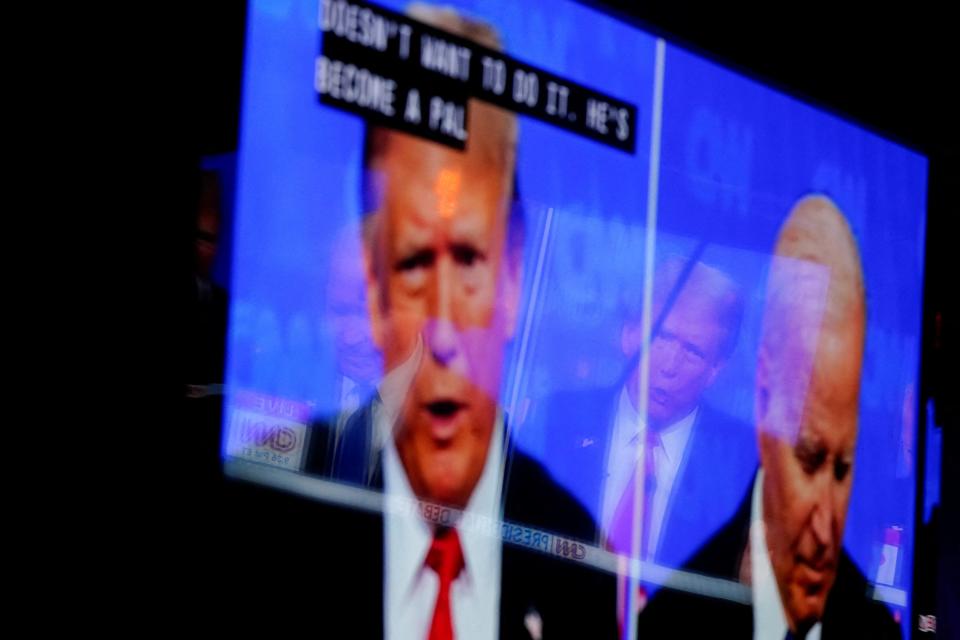What happens if a presidential candidate dies?
What happens if a presidential candidate dies?
Yes, it is a morbid question. Still, President Joe Biden is 81 and former President Donald Trump is 78.
Having two elderly leaders competing for a four-year term in the White House, coupled with the assassination attempt on Trump Saturday and news on Wednesday that Biden has COVID for a third time, raises the logical question of who decides the nominee if a candidate dies or is incapacitated during their campaign.
The answer: It depends on when in the process it happens, election experts told USA TODAY. But the major political parties have rules in place to make the process as smooth as possible.
“Any one who is planning an election … knows this is a possibility,” said Rebecca Green, an associate professor of election law at William & Mary. “Most states have developed procedures that are used relatively routinely.”

If a presidential candidate dies before the convention
The GOP officially nominated Trump Monday at the Republican National Convention, so this part doesn't apply to him. But it does for Biden because the Democratic National Convention delegates haven't voted yet.
If the incumbent Democratic president were to die or become incapacitated before they vote, his delegates would essentially be released and the party would hash out who the nominee would be at the Chicago convention that runs Aug. 19-22. Presidential hopefuls would have to work to convince the party faithful representing each state to support their bid.
“It is essentially a party matter,” reminiscent of how candidates were chosen before primaries became prevalent over the last few decades, said John Fortier, the principal contributor to the American Enterprise Institute-Brookings Election Reform Project.
More: Joe Biden has everyone worried. Let’s talk about aging, for real.
If a presidential candidate dies between the convention and Election Day
If a Democratic presidential nominee dies between the convention and Election Day, the Democratic National Committee would choose a candidate in consultation with the party's House and Senate leaders and the Democratic Governors Association.
Democrats have done this just once before, in 1972. That's when presidential candidate George McGovern decided to replace his running mate, Missouri's Thomas Eagleton, on the Democratic ticket after news broke that Eagleton had been hospitalized for depression and underwent electroshock treatment.

Robert Sargent Shriver was selected as the Democratic nominee for vice president at a special meeting of the Democratic National Committee a little more than two weeks after the convention in Washington, D.C.
For the GOP, Republican National Committee members would vote by delegation to select a candidate. The delegates would possibly be recalled to vote in person
Where it starts to get difficult is if a candidate dies or becomes incapacitated after states have already begun to print ballots. By early September, ballots are being printed and sent out to comply with federal laws ensuring that Americans living overseas, including members of the military, get a chance to vote.
“Different states have different rules for how to replace candidates and when,” Greene said.

More: Joe Biden is old. So is Donald Trump. So are millions of other American workers
Even if it is too late to remove a name from ballots, the Democrats and Republicans would name a new nominee as their standard-bearer.
Fortier said it's important to remember that when people cast a vote, they aren't voting for a candidate, but for electors who will vote for their preferred party in the Electoral College.
Because of that, electors in most states could simply vote for the replacement nominee, regardless of which name is actually on the ballot, he said.
Nevertheless, it gets complicated once again if a candidate dies or becomes incapacitated when electors vote because of state laws restricting who the electors can vote for.

“There is a potential for some confusion,” said Ned Foley, director of the Election Law Program at Ohio State. That's because about a dozen states either don’t specifically address what electors should do if a candidate has dies, or have laws obligating electors to vote for the name on the ballot rather than the party’s nominee, he said
States might move to change the law, or the question of who electors should vote for could be decided in state courts, he said.
If a presidential candidate dies before Congress meets on Jan. 6
The biggest complication would be if a candidate would die or become incapacitated between when the Electoral College votes in early December and when Congress meets on Jan. 6 to certify the results of the election.
It's "not 100% clear Congress would count the votes for somebody who is deceased,” Fortier said. And if neither candidate has the 270 Electoral College votes needed to secure the presidency, the results of the election would then be decided by the House in what is called a contingent election.
If a president-elect dies or is incapacitated after Congress votes to certify the election results, the 20th Amendment would kick in, meaning the order of succession would be in place. The vice president would step in and be sworn in as president on Inauguration Day.
This article originally appeared on USA TODAY: What happens if a presidential candidate dies?